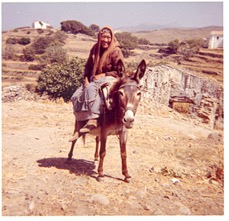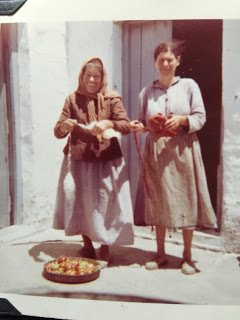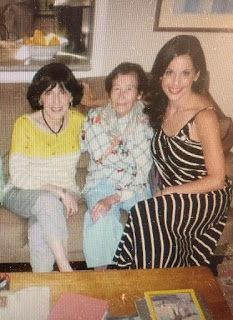In 1944, World War 2 raged on. And like many other European countries, Greece remained occupied by Axis forces with the fate of Yiayia's family woefully uncertain. Axis forces were killing Greeks in the mainland at an alarming rate. But life on Yiayia's native island of Kythera - in the southernmost tip of Greece - would not be as deadly. Kythera wasn't an industrial port so there were few bombings and uprisings.
But enemy forces damaged roads, bridges, forests, and natural resources which created terrible hardships for the Kytherians. They looted homes, confiscating food, weapons, and anything of use. The German army commandeered Papou's ancestral home where he andYiayia once lived, forcing relatives to live elsewhere. They used the upper floors as an observation post and the main floor as a stable for their horses.
As another conquest strategy, the Germans decimated the Greek economy by counterfeiting currency. The drachma became worthless. And with no money to buy food, the Greeks had to rely on bartering, the black market, or whatever the island could produce. By the thousands, my grandparents' countrymen and fellow Kytherians were starving. And Yiayia could not help but fear -- were her beloved mother and siblings among them?
As she would later discover, her mother Damiani was largely, mercifully, left alone. Her modest stone cottage in the mountainous village of Agia Anastasia proved little temptation to the enemy. So Damiani was left to use her gift of growing to produce the mainstays of Kytherian fields: olives, almonds, figs, and grapes. Her goats provided milk and cheese, the chickens and their eggs a source of protein.
Yiayia's mother would then share her bounty - scarce as it was - with fellow villagers who would have otherwise gone without. For that selfless act, her fellow peasants would revere Damiani for her wartime kindness and sacrifice. And her family would dub her "the indomitable Damiani." For there is no doubt that Damiani taught her daughter - my Yiayia - that "such is the life''. And so as Damiani gracefully demonstrated - the human spirit had no choice but to adapt and to endure.
And soon Yiayia would be forced to do just that yet again. Because even as she despaired for her loved ones in Greece, she had a new worry to consider. Just before 8 a.m. on December 7th, 1941, hundreds of Japanese fighter planes attacked the American Naval Base at Pearl Harbor. And the next day, President Franklin D. Roosevelt asked Congress to declare war against Japan. That declaration passed with just one dissenting vote. More than two years into the conflict, the United States would finally join World War II. The sleeping giant had awoken. And the America my Yiayia had come to love would never be the same again.


